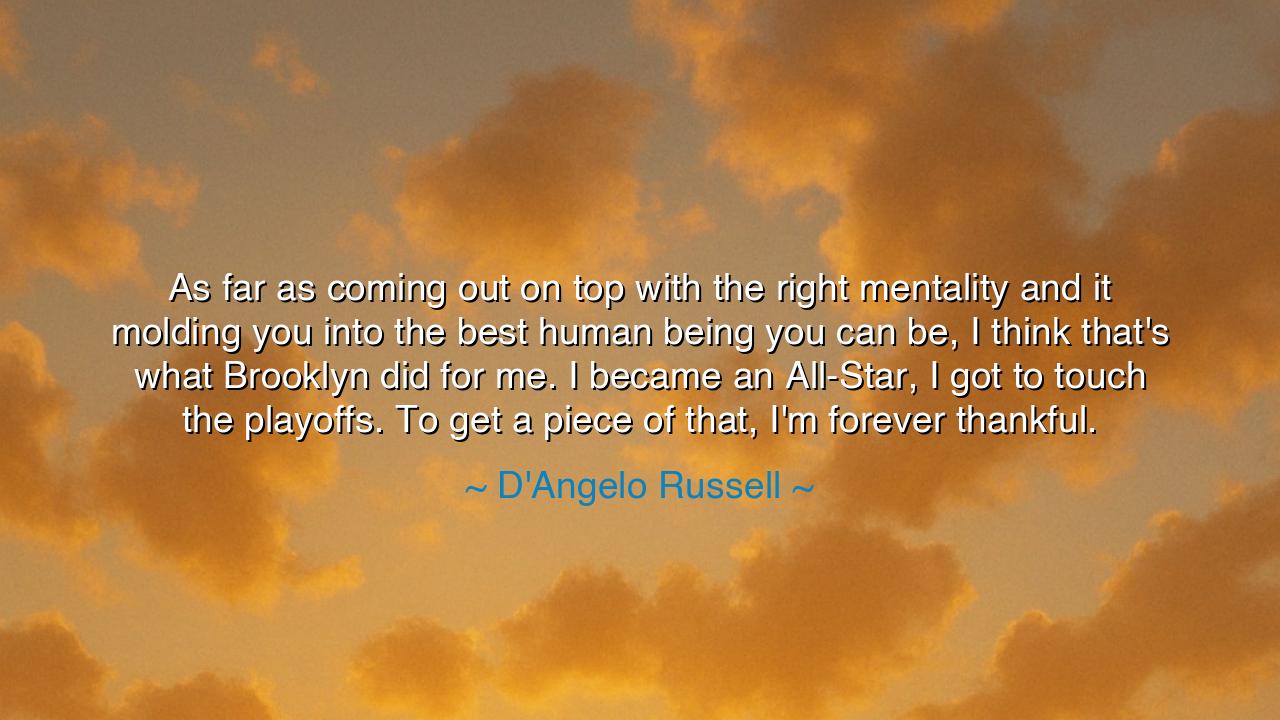
As far as coming out on top with the right mentality and it
As far as coming out on top with the right mentality and it molding you into the best human being you can be, I think that's what Brooklyn did for me. I became an All-Star, I got to touch the playoffs. To get a piece of that, I'm forever thankful.






D’Angelo Russell once declared with honesty and reflection: “As far as coming out on top with the right mentality and it molding you into the best human being you can be, I think that’s what Brooklyn did for me. I became an All-Star, I got to touch the playoffs. To get a piece of that, I’m forever thankful.” These words are more than the recollection of an athlete; they are the testimony of a man who endured trials, learned discipline, and emerged transformed by both struggle and opportunity. They speak to the eternal truth that environment and adversity shape character as much as they shape destiny.
The ancients often told of lands and cities that forged greatness within those who passed through them. Rome hardened generals with its politics and wars, Athens sharpened philosophers with debate and dialogue, and Sparta molded warriors through its discipline. In the same way, Russell speaks of Brooklyn not simply as a team, but as a crucible. It tested him, pressed upon him, demanded a higher standard, and in the fire of those demands, he was reshaped—not just into an All-Star, but into a stronger human being.
The heart of this reflection lies in the mentality. For physical talent may lift a man, but only the right mindset sustains him. Russell points to this truth: success is not merely measured in statistics or accolades, but in the inner transformation that hardship produces. This echoes the wisdom of Marcus Aurelius, who declared that the soul becomes stronger through trial, and that one’s true crown is not external recognition, but mastery of self. In Russell’s journey, the mentality born in Brooklyn became the foundation for everything that followed.
He names, too, the concrete fruits of that season: the honor of becoming an All-Star, the taste of the playoffs, the victories that rewarded his perseverance. Yet notice that he does not cling only to these outward triumphs. Rather, he frames them as pieces of a larger gift: the growth of his spirit, the molding of his character. In this way, he mirrors the ancient heroes who spoke not only of their conquests, but of what the battlefield taught them about courage, loyalty, and endurance. The medals and crowns pass, but the man forged in fire endures.
History offers us countless parallels. Consider Abraham Lincoln, who endured repeated political defeats before rising to the presidency. Each loss was bitter, but it molded his mentality, teaching him resilience, empathy, and humility. By the time he entered office, he was no longer merely a politician but a leader prepared for the storm of civil war. Like Russell, he could look back on the crucible of earlier struggles with thankfulness, seeing not only the wounds but the wisdom that came from them.
The deeper meaning of Russell’s words is this: gratitude must encompass not only ease and victory, but also the trials that mold us. To be thankful for the journey, even when it includes hardship, is to embrace life’s greatest wisdom—that we are not defined by what happens to us, but by what we become through it. Brooklyn, for Russell, was not just a chapter of games and seasons; it was the forge where iron was turned into steel.
The lesson for us is clear. Cherish the crucibles of your own life—the places, people, and moments that tested you most. See in them not curses, but opportunities to grow into the best version of yourself. Honor the victories, yes, but honor also the molding, the inner strength born through trial. Be thankful not only for the summit but for the climb, for it is the climb that shapes the soul.
Practical counsel may be given. When faced with adversity, do not shrink away, but ask: What is this teaching me? How is this molding me? Keep a spirit of gratitude, even for the hardest seasons, for they may later be revealed as the foundations of your greatest strength. And when success comes—when you taste your own “All-Star” moments—remember to give thanks not only for the glory, but for the fire that forged you. In this way, like D’Angelo Russell, you will live not merely as a victor in the world’s eyes, but as a human being refined by trial and uplifted by gratitude.






AAdministratorAdministrator
Welcome, honored guests. Please leave a comment, we will respond soon